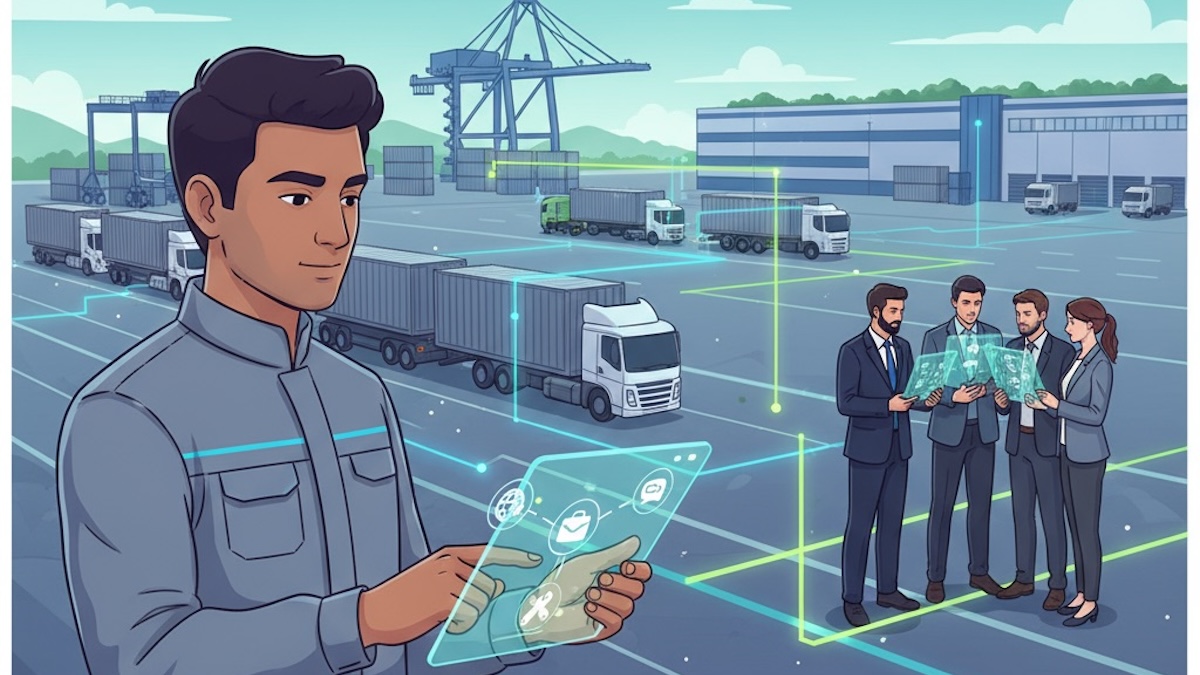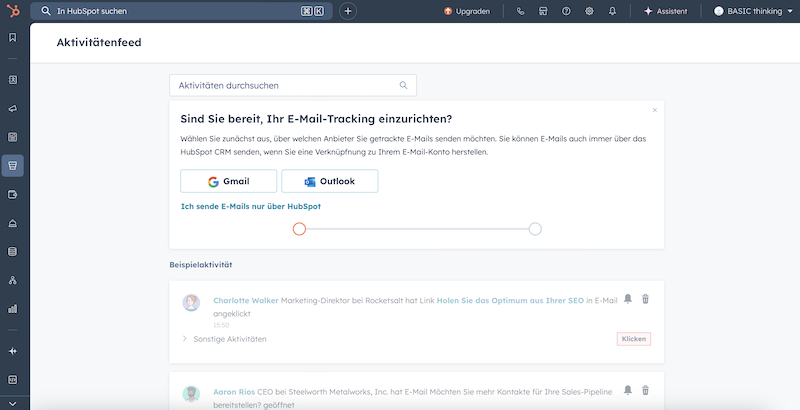The article CRM for logistics companies: Centralize shipment tracking, customer service and offer management first appeared in the online magazine BASIC thinking. With our newsletter UPDATE you can start the day well informed every morning.

The logistics industry is under pressure: customers expect transparent shipment tracking, fast response times and individual offers – all while increasing cost pressure and growing complexity. If you want to grow and remain competitive as a logistics service provider, you have to digitize processes and make communication with customers, partners and your own team more efficient. A CRM platform like HubSpot offers the perfect basis for clearly bundling customer inquiries, offers, order status and service cases and controlling them automatically.
Requirements for a CRM in logistics
Modern logistics companies need more than just an address database. A powerful CRM should:
- Offer central management of all customers, orders and shipments: The CRM records all customer contacts, order details, delivery addresses and shipment data in a structured manner.
- Digitize offer and order management: From the inquiry to the offer to the order placement and follow-up, everything runs in a consistent workflow.
- Automate shipment tracking and status reports: The status of the delivery can be accessed at any time, automatic updates and tracking links provide ongoing information about the current status.
- Process service cases and complaints efficiently: In the Service Hub you create tickets, prioritize them and assign them to the right contact person.
- Mobile use and team coordination enable: Field sales, scheduling and service access current data from anywhere.
- Ensure GDPR compliance and data security: The CRM securely stores customer data and documents access rights and consents.
Practical example: How a logistics company simplifies everyday life with HubSpot
A medium-sized freight forwarder receives numerous inquiries every day via various channels. The coordination of offers, shipment tracking and complaints has so far been carried out using several isolated solutions. With HubSpot everyone will Customer contacts, orders and service cases centrally in the CRM managed. The CRM creates offers directly from the system and automatically sends status updates and tracking links. Service requests land as tickets in HubSpot’s Service Hub and are processed based on urgency.
The result
- Faster response times to customer inquiries
- Fewer errors through consistent data
- Improved transparency for customers and your own team
- More time for personal advice and additional services
How LogiNext simplifies everyday life with HubSpot
The international logistics company LogiNext uses HubSpot to collect leads and customer inquiries from various channels actively coordinate and increase service quality. LogiNext has been qualifying since the introduction of HubSpot four times more leads and bundles all customer communication centrally.
Automated workflows record inquiries, create offers and control shipment tracking. Service cases end up as tickets in the service hub and the team processes them according to urgency. LogiNext reacts faster, works more error-free and creates more transparency for customers and employees.
Inbound marketing and loop marketing in logistics
With HubSpot you are targeted Inbound marketing. You attract potential customers through relevant content and automated email campaigns and guide them through to completion. This is how companies win, especially in logistics new business customers and increase yours Brand awareness.
You also use the concept of Loop marketing: You don’t just acquire customers once, you activate them continuously through regular communication and service offerings. HubSpot helps you collect feedback and reviews, send proactive notifications, and offer additional services. This is how you create a sustainable cycle of information, interaction and improvement.
Typical workflows and automations in logistics with HubSpot
| Workflow/Automation | Benefits for the logistics company |
|---|---|
| Inquiry and offer workflow | Customer inquiries are automatically recorded, offers are created and follow-ups are scheduled |
| Tracking | Send automatic status updates and tracking links to customers |
| Service ticket management | Complaints and service cases are processed and tracked in a structured manner |
| Mobile team coordination | Dispatchers and drivers access order data via mobile devices |
| Reporting & Dashboards | All key figures for orders, service cases and customer satisfaction at a glance |
Proactive customer information and service quality: Logistics as an experience
In the logistics industry, the flow of information is often just as important as the actual delivery. Today, customers not only expect their… shipment arrives on time, but you want to be informed about the current status at all times. With a CRM like HubSpot Logistics companies can meet and even exceed this service requirement.
The platform makes it possible to send automated status reports and proactive notifications to customers – for example when shipping, arriving at interim storage or in the event of delays. customers receive Tracking links, status updates via email or SMS and can thus track their delivery in real time. This reduces queries in the service and ensures more transparency and trust.
In addition, logistics companies can use the CRM to obtain targeted feedback, for example after delivery or for special transports. Customer reviews and feedback are documented centrally and incorporated directly into quality improvement. Complaints are recorded in a structured manner and tracked within the team so that solutions can be found more quickly.
Through this proactive and transparent communication the Service quality sustainably increased. Customers feel taken seriously and well looked after – a decisive advantage in a market in which reliability and customer satisfaction are increasingly becoming a differentiating factor. Logistics becomes not just a service, but a real customer experience.
Step-by-step: Digitalization with HubSpot in logistics
- HubSpot-Set up account: Logistics companies register and choose the appropriate data protection region.
- Data import: Existing customer, order and shipment data are imported via CSV import.
- Configure workflows: Automated processes for inquiries, offers, shipment tracking and service cases are set up.

The activity feed at HubSpot - Activate mobile use: Teams and drivers have access to relevant data via smartphone or tablet.
- Customize dashboards: Individual evaluations for order status, service quality and utilization are created.
- Ensure GDPR compliance: Access rights are assigned individually and consents are documented.
Software comparison: HubSpot CRM vs. CargoSoft TMS for logistics companies
Many logistics companies rely on specialized transport management systems (TMS) such as CargoSoft, which were developed specifically for freight forwarders and freight companies. CargoSoft scores with comprehensive functions for order processing, freight billing, customs clearance and scheduling. It is particularly indispensable for the operational control and processing of transports.
HubSpot On the other hand, the focus is on managing customer relationships, offer management, communication and marketing. The platform makes it easy to manage leads, automate service processes and track customer inquiries. HubSpot CRM can be connected to CargoSoft or other TMS solutions via interfaces so that operational and customer-related processes work together optimally.
Conclusion: CargoSoft is the ideal solution for operational transport control and freight processing. HubSpot CRM complements this structure perfectly when it comes to customer communication, offer management and service quality. The combination of both systems gives logistics companies a real competitive advantage.
Reporting and key figures: transparency in real time
With the analysis functions of HubSpot Logisticians keep an eye on all relevant key figures:
- Number and status of open orders
- Processing times for offers and service cases
- Customer satisfaction and complaint rate
- Utilization of teams and fleet
- Success rate in acquiring new customers
Dashboards make trends visible and help to specifically optimize processes.
Data protection and trust: mandatory in the logistics industry
Protecting sensitive customer and shipment data is a must, especially in logistics. HubSpot complies with GDPRoffers hosting in European data centers and enables the individual assignment of access rights. All data processing is documented, consent is systematically recorded and the deletion of data after completion of an order can be automated. This is how logistics companies build trust and meet all legal requirements.
FAQ: CRM for logistics companies – the most important questions
Is HubSpot suitable for small and large logistics companies?
Yes, the platform grows with every business model and is flexibly adaptable.
Can I connect HubSpot with TMS software like CargoSoft?
Yes, a connection is possible without any problems via interfaces and integration services.
How does automation help in everyday life?
Workflows save time, prevent errors and ensure consistently high service quality.
How secure is my data?
HubSpot is GDPR compliant and offers European data centers for privacy-conscious companies.
How quickly can I start?
The setup is completed in just a few hours and the first automations are quickly ready for use.
Conclusion: CRM as a motor for digital logistics processes
A CRM like HubSpot puts logistics companies on the fast track: customer inquiries, offer management and service are managed digitally, transparently and efficiently. In combination with a specialized TMS solution like CargoSoft, logisticians benefit from maximum process control and best customer loyalty – for more growth and sustainable success in the digital age.
Try HubSpot for free now and find out how easy digitalization in the logistics sector can be
The post CRM for logistics companies: Centralize shipment tracking, customer service and offer management appeared first on BASIC thinking. Follow us too Google News and Flipboard or subscribe to our newsletter UPDATE.
As a Tech Industry expert, I believe that implementing a CRM system for logistics companies can greatly enhance their operations and customer service. By centralizing shipment tracking, customer service, and offer management, companies can streamline their processes and provide a more efficient and personalized experience for their clients.
Having a centralized system for tracking shipments allows companies to easily monitor the status of each delivery, anticipate any potential delays, and proactively communicate with customers about the progress of their orders. This not only helps improve customer satisfaction but also allows companies to better manage their resources and optimize their logistics operations.
In addition, a CRM system can also help logistics companies improve their customer service by providing a centralized platform for managing customer inquiries, complaints, and feedback. By keeping all customer interactions in one place, companies can ensure that no issues fall through the cracks and that they are able to provide timely and effective responses to customers.
Furthermore, by centralizing offer management, logistics companies can better track and manage their pricing, promotions, and discounts, ensuring that they are able to maximize their revenue and profitability. This can also help companies better understand their customers’ preferences and behavior, allowing them to tailor their offers and promotions to better meet their needs.
Overall, implementing a CRM system for logistics companies can help them improve their operations, enhance their customer service, and ultimately drive growth and profitability. It is a valuable investment that can help companies stay competitive in today’s fast-paced and competitive market.
Credits